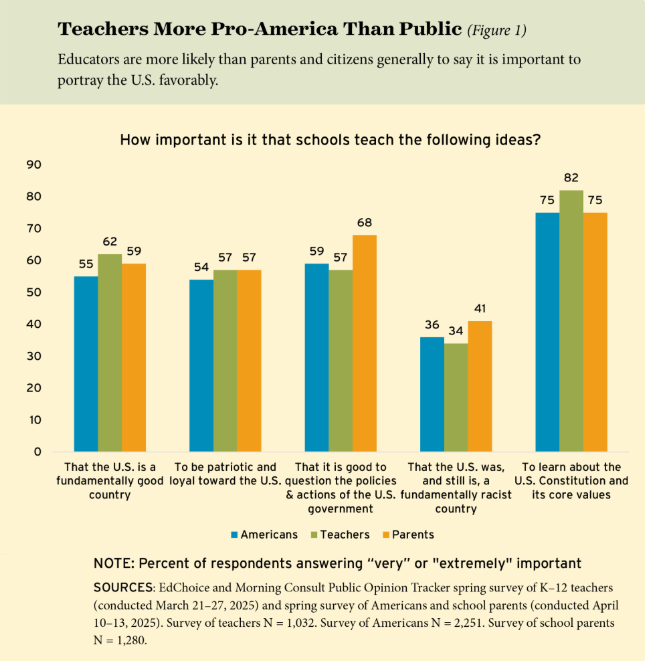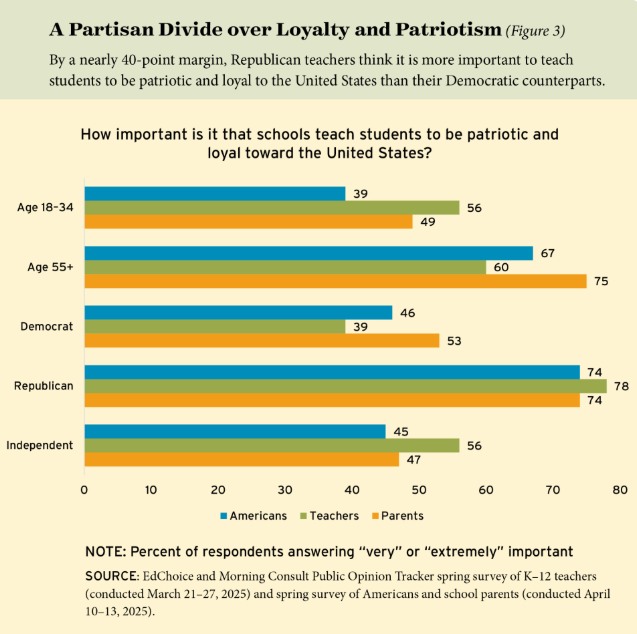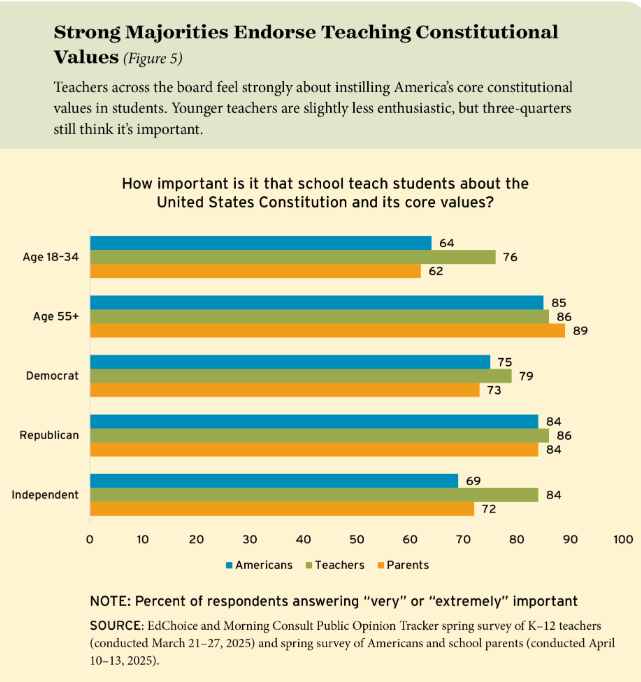The past decade of American soul-searching has left many adrift. Is America a fundamentally good country? Has it ever been–or will it ever be in the future? Should children be told that America is fundamentally evil, or fundamentally good? Within the debate, teachers have received a good portion of blame for the impulse to rewrite the historic narrative. Critics, aghast at several high-profile cases of anti-American activism in the classroom, traced back mass American skepticism to unwarranted high school demagoguery from teachers. But a new nationally representative survey suggests that those teachers are the exception to the norm, and most of our civil servants — including those on the left and the right — believe that schools should teach that America is a fundamentally good country.
Teachers are downstream of culture
Interestingly, teachers actually buck the wider trends of American culture, which shows increasing cynicism and decreasing patriotism. That’s no surprise, considering the recent politically tumultuous times that have wrecked public confidence in institutions. In 2003, Gallup found that 90 percent of Americans were “extremely” or “very” proud to be American. Compare this to a near-record low of 58 percent in 2025. Meanwhile, a 2025 Harvard Youth poll (which surveys 18-29 year olds) found that only 15 percent of them thought that the country was heading in the right direction.
The unreflective American exceptionalism popular after WW2 and the Cold War has slowly faded as the generations pass on, and an increased academic desire to examine the failings and pitfalls of American history has brought old wounds to the forefront of the American imagination. America’s crisis of identity must find a mature, complex self-definition that is honest about triumphs and tribulations alike — but also seeks to center a strong love for the country that finds its expression in service. The authors of the recent teacher survey, including professor Brian Kisida, wrote
That students shouldn’t be taught to hate America is self-evident. A nation survives by passing its history and values to future generations, and the core principles that guide the American experiment rank among the world’s most exemplary and enduring ideas. Students should learn the full truth about America—its strengths, flaws, and unrealized aspirations—while embracing the core American principles of liberty, justice, the rule of law, and human dignity. Every generation bears the responsibility to sustain and advance the American experiment.
Yet the evidence does not indicate that an anti-American teacher workforce is responsible for the general malaise among youth toward America.
Teachers are part of American society, and are affected by it the same way as everyone else. While they may indeed be conducting their own soul-searching about how to espouse patriotism in a topsy-turvy civic landscape, this survey strongly suggests that they are not primarily responsible for any current anti-civic sentiment. The survey authors suggest that
We suspect much of the partisan ire directed at teachers is misplaced and might more appropriately be directed toward those who claim to speak on behalf of teachers—education school faculty, education professional associations, and teachers unions, who tend to be more left-leaning than the teacher workforce.
Teachers are sometimes more patriotic than their communities
The survey found that, on many divisive issues today, teachers were more likely to portray the U.S. favorably than the average American.

This may be explained by the transformative role that the act of teaching plays on the teacher’s psyche. A teacher dedicates their career and their craft to the children they teach. They know well that those children represent the future of America. On a (very) fundamental level, American cynicism from a teacher represents cynicism towards the success of their work — a pessimism about the abilities and futures of the young minds present before them daily. Even if that civic cynicism is warranted, a good teacher, who spends their days fighting optimistically for a better future, will be predisposed away from it.
Yet the optimistic self-selection of teachers doesn’t escape generational attitudes about America. Even though many young teachers (aged 18-34) believe it’s important that schools teach students that the United States is fundamentally a good country (57 percent think so), their patriotic attitude lags far behind older teachers (72 percent of teachers aged 55+) who think the same thing.

The strength of bipartisan pro-American sentiment, however, cools once more precise issues are in focus. Republican teachers think it is more important to teach students to be patriotic and loyal to the United States (78 percent) than their Democratic counterparts (39 percent). As a majority of public school teachers are left-leaning, it seems likely that many classrooms are not receiving spirited, patriotic programming.

However, Democratic teachers find their civic-minded nature elsewhere. Even if they don’t necessarily want to foster patriotic spiritedness, a high majority (86 percent) think that it’s important to teach about the United States Constitution and its core values.

These survey findings suggest that concerns about anti-American sentiment or indoctrination should not be directed at teachers. They also suggest that there is a strong foundation upon which a shared consensus can be built; that the majority of teachers, across political parties, believe in the future of America.
Kisida and the other survey authors concluded thus:
Rebuilding trust in the government and sustaining our democratic values requires a commitment that transcends partisan loyalties and challenges the extreme views that have given rise to increasingly illiberal tendencies, … But history shows that many of America’s most inspiring chapters have emerged from our darkest hours. Though the belief that America is good remains strong among most Americans and educators, preserving our values and living up to them is a perpetual responsibility. Civic-education reforms that emphasize constitutional principles and the superiority of democratic values can help rebuild trust in democratic institutions and renew faith in the American experiment. America, while imperfect, is still worth defending if we believe in its promise and commit ourselves to its future.










